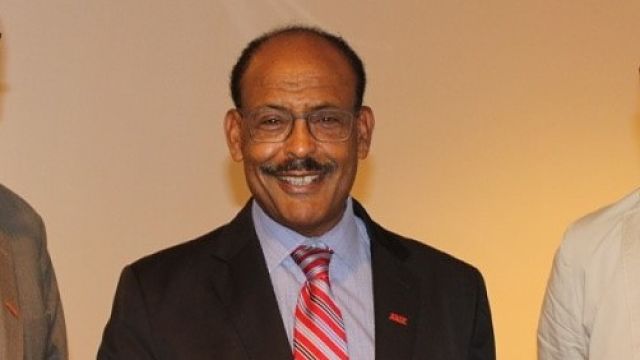 Lemma W. Senbet is the William E. Mayer Chair Professor of Finance at the University of Maryland, College Park, and an immediate former Executive Director/CEO of the African Economic Research Consortium. (Courtesy photo)
Lemma W. Senbet is the William E. Mayer Chair Professor of Finance at the University of Maryland, College Park, and an immediate former Executive Director/CEO of the African Economic Research Consortium. (Courtesy photo)
Tadias Magazine
By Tadias Staff
Updated: April 20th, 2020
New York (TADIAS) — This week Professor Lemma Senbet, an Ethiopian-American financial economist and the William E. Mayer Chair Professor at University of Maryland, will be moderating an online seminar focusing on the global economic impact of the COVID-19 pandemic and its ramifications on African countries.
The webinar, which is titled ‘COVID-19 and African Economies: Global Implications and Actions’ is being hosted by the Center for Financial Policy at University of Maryland Robert H. Smith School of Business.
Professor Lemma told Tadias that the virtual conference features representatives from two of the world’s flagship international financial institutions: IMF and World Bank. Speakers include Rabah Arezki, the World Bank’s Chief Economist for the Middle East & North Africa as well as Domenico Fanizza, who is an Executive Board Member of the International Monetary Fund (IMF).
The announcement notes that the “webinar is intended to be interactive between panelists and participants through questions and commentaries,” emphasizing that the panel “will discuss the global implications of the COVID-19 economic impact on developing and low-income countries, with Africa as an anchor.”
According to the World Health Organization (WHO) as of this month “the number of confirmed COVID-19 cases in Africa has risen to more than 10,000 and caused more than 500 deaths. While the virus was slow to reach the continent compared to other parts of the world, infection has grown exponentially in recent weeks and continues to spread. Africa’s first COVID-19 case was recorded in Egypt on February 14th. Since then a total of 52 countries have reported cases. Initially, mainly confined to capital cities, a significant number of countries in Africa are now reporting cases in multiple provinces.”
Prof. Lemma says whether the number of cases surges upward or not the economic consequences are unavoidable given the decline in import and export worldwide and other factors.
The webinar will address several questions including the following:
COVID-19 has touched the entire 8 billion (almost) population on this planet and reminded us that we are totally interconnected. In this context, why should Africa and other low-income countries matter to the rest of the globe?
What have been the key global responses to date and what are the gaps? In particular, what are the respective responses of major international institutions – the World Bank, IMF, UNDP, regional institutions, such as the African Development Bank?
How should bilateral institutional and government lending partners respond to the need for efficient resolution of what appears to be a looming debt crisis? What do you expect the role of China would be in this regard?
In the new landscape, unlike the HIPC era, many African countries began accessing international private debt markets at arm’s length. However, this has pushed up the debt servicing costs so that debt sustainability can no longer be based on the debt/GDP levels but its totality, including debt service costs. How do private actors respond to the crisis and what would be the role of international financial institutions to facilitate that?
What are the reforms to be put into place in a global partnership to help mitigate the consequences of pandemics in the future?
What does globalization look like post-COVID-19? Who will be winners and losers? Is win-win globalization more feasible moving forward, or just the opposite?
—
If You Attend:
Date and time: Friday, April 24, 2020 9:45 am
Eastern Daylight Time (New York, GMT-04:00)
Duration 1 hour 30 minutes
Click here to Register
—
Related:
Interview: Dr. Lemma Senbet on the Ethiopian Diaspora Trust Fund
Join the conversation on Twitter and Facebook.

























